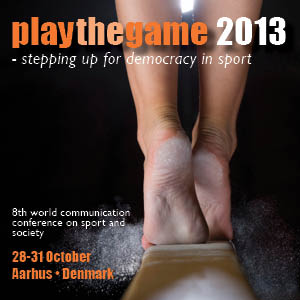 During the next couple of months, I will present some tidbits of observations from the ‘Play the Game’ conference which I recently attended. As I hope some of you have become aware in recent years, when I have made references to the work of this organization, it is the one group in the world of sport, whose efforts in the areas of governance and anti-corruption I really respect and support. Apart from its continuous efforts, ‘Play the Game’ organizes a global conference every two years. This time it was held at their home base in Aarhus, Denmark. Around 400 journalists, sports officials and academics from around the world attended.
During the next couple of months, I will present some tidbits of observations from the ‘Play the Game’ conference which I recently attended. As I hope some of you have become aware in recent years, when I have made references to the work of this organization, it is the one group in the world of sport, whose efforts in the areas of governance and anti-corruption I really respect and support. Apart from its continuous efforts, ‘Play the Game’ organizes a global conference every two years. This time it was held at their home base in Aarhus, Denmark. Around 400 journalists, sports officials and academics from around the world attended.
The coverage includes a broad spectrum of topics, beyond the general issues of governance, ethics, and corruption in national and international sports organizations. The many problems discovered within the realm of the IOC and especially in FIFA have had a lot of exposure. Doping-related topics have figured prominently on the agenda for many years now, and the Lance Armstrong affair has only served to increase the concerns regarding doping. Match fixing has emerged as another core issue, in light of the ever-increasing number of discoveries of such problems in different sports around the globe.
But many issues also relate to the tension or competition between, on the one hand, resources and facilities for sports activities for the masses and, on the other hand, the enormous resources spent on events and stadiums for events such as the OIympic Games and the World Cup in soccer. Are we catering too much to passive spectators in elite events, at the expense of physical education, health, and fitness for both the young and the adults? And does it remain sensible to incur such huge expenses for one-time events in countries where the overall population sees many of its basic needs go unmet.
This debate has been particularly acute in recent time, considering the massive construction in Sochi for the Winter Olympics, and the national reactions in Brazil regarding the Summer Olympics in 2016 and the World Cup in 2014. When soccer-crazy Brazil sees violent demonstrations against these events, then that should perhaps be an eye-opener. The Winter Games in Russia have caused another debate to surface, namely about the impression that only authoritarian regimes with vast resources can genuinely compete for the hosting of such big events. Similar questions have come up in connection with Qatar’s successful bid for the soccer World Cup in 2022.
But for the moment I will leave you with this overview of some of the topics that I will expand on in subsequent articles. I will just add a comment that I received from a Russian journalist who attended the ‘Play the Game’ conference. It is of course a general trend these days that media reporting from sports events focuses on results, statistics, injuries, transfers and cute background stories about star athletes. But my Russian friend seemed a bit confused or disturbed at one point: “why are there so many stories and reports about problems and negative issues”, was his question. Perhaps he had not quite realized beforehand that this is one of the main purposes of the ‘Play the Game’ organization and its conferences. There is another side of the coin; sports, unfortunately, does not have just a sunny and glossy side. There are too many people and issues which serve to undermine the benefits and enjoyment of sports. We need to shine a light on that!
